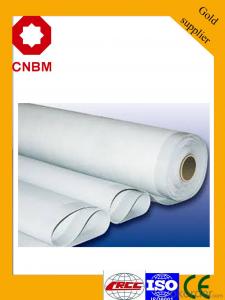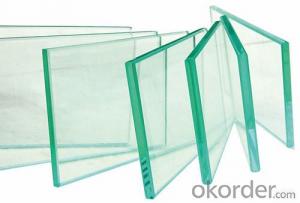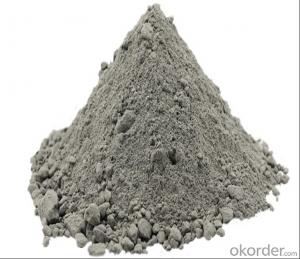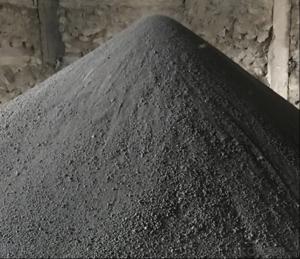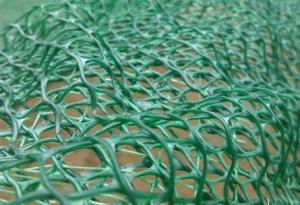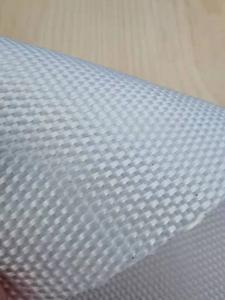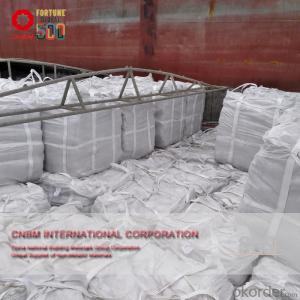SBS/APP Modified Bitumen Waterproof Membrane- Hot Sell In South East Asia
- Loading Port:
- Shanghai
- Payment Terms:
- TT OR LC
- Min Order Qty:
- 44 roll
- Supply Capability:
- 100000 roll/month
OKorder Service Pledge
OKorder Financial Service
You Might Also Like
Product description
SBS modified bitumen waterproof membranes use high quality needle punched polyester mat or fiberglass compound mat as the base reinforcement. And use SBS modified bitumen as the dip-coat material. The SBS modified bitumen waterproof membrane are widely used for roof waterproof projects.
Main performance
1.Good low temperature performance, especially suitable for cold regions.
2.Good weather resistance, tensile property, extensibility, corrosion resistance and so on.
3.Strong adaptability for substrate shrinkage, deformation and cracks.
4.Convenient to apply: use heat fusion method in all seasons.
5. Meet national standards.
6.ISO Certification.
Technical Parameters
No. |
Item | Index | |||||||||
Ⅰ | Ⅱ | ||||||||||
PY | G | PY | G | PYG | |||||||
1 |
soluble content(g/m2) ≥ | 3mm | 2100 | — | |||||||
4mm | 2900 | — | |||||||||
5mm | 3500 | ||||||||||
test phenomenon | — | non-ignitable | — | non-ignitable | — | ||||||
2 |
heat resistance | °C | 90 | 105 | |||||||
≤mm | 2 | ||||||||||
test phenomenon | no flow or drippage | ||||||||||
3
|
low temperature flexibility °C | -20 | -25 | ||||||||
no flaw | |||||||||||
4
|
water tightness 30min
|
0.3Mpa |
0.2Mpa |
0.3Mpa
| |||||||
5 |
tension | tension of maximum peak rate%≥ | 500 | 350 | 800 | 500 | 900 | ||||
tension of maximum peak rate%≥ | — | — | — | — | — | ||||||
test phenomenon | no cracks or separate | ||||||||||
6 |
elongation
| elongation of maximum peak rate%≥ |
30 |
— |
40 |
— | |||||
elongation of second peak rate%≥peak rate%≥ |
— |
— |
15 | ||||||||
Product usage
The waterproof , dampproof and seepage-proofing of roof, basement, tunnel and so on.
Packaging and storage
1)Avoid insolating, raining; the temperature shall be 4-45°C;
2)Keep them stand up and vertical;
3)Do not stack up over two tiers, avoid tilting and lateral drift.
product show
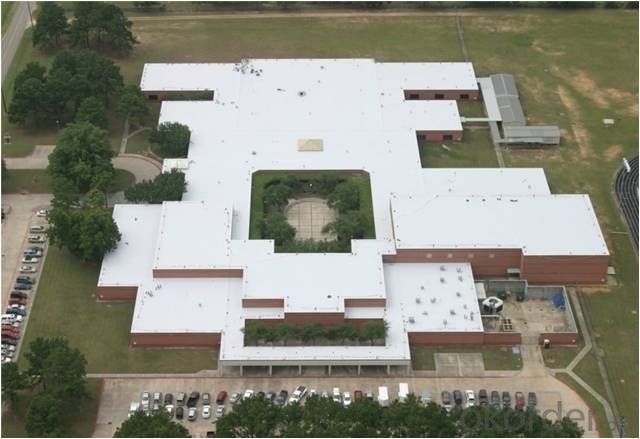
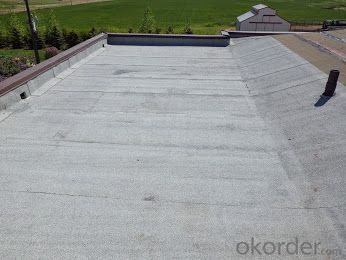
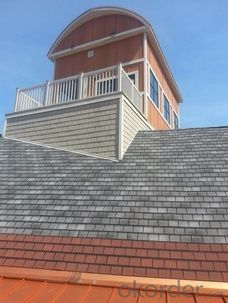
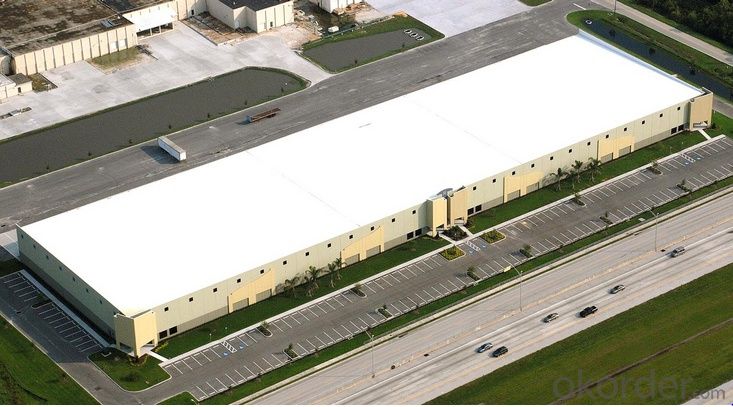
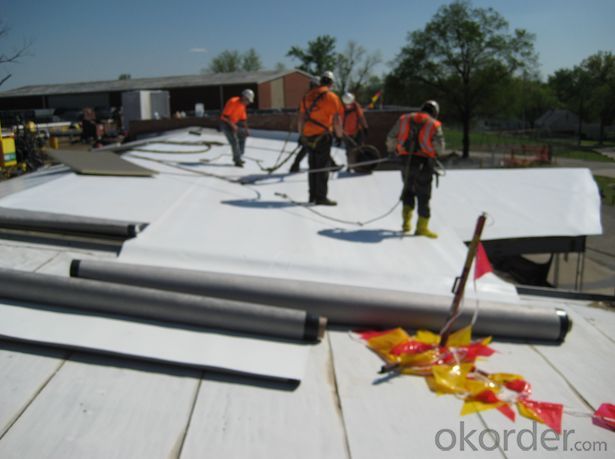
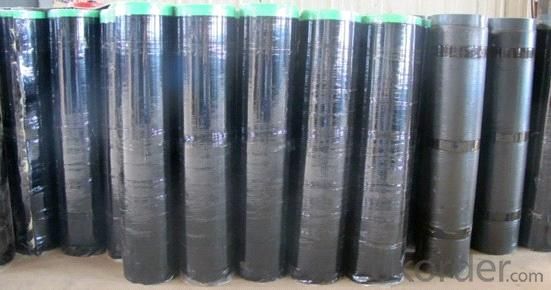
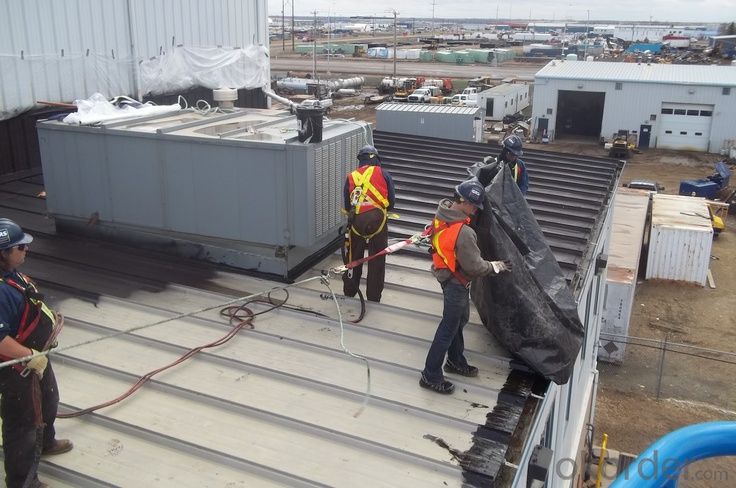
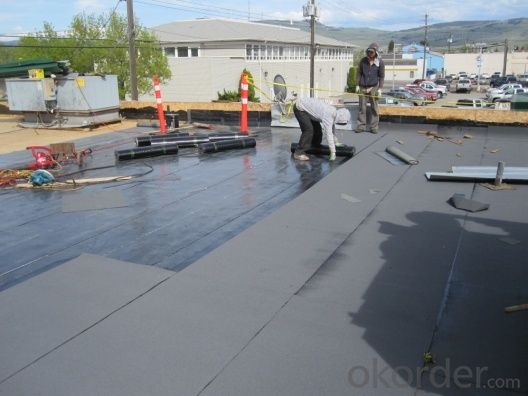
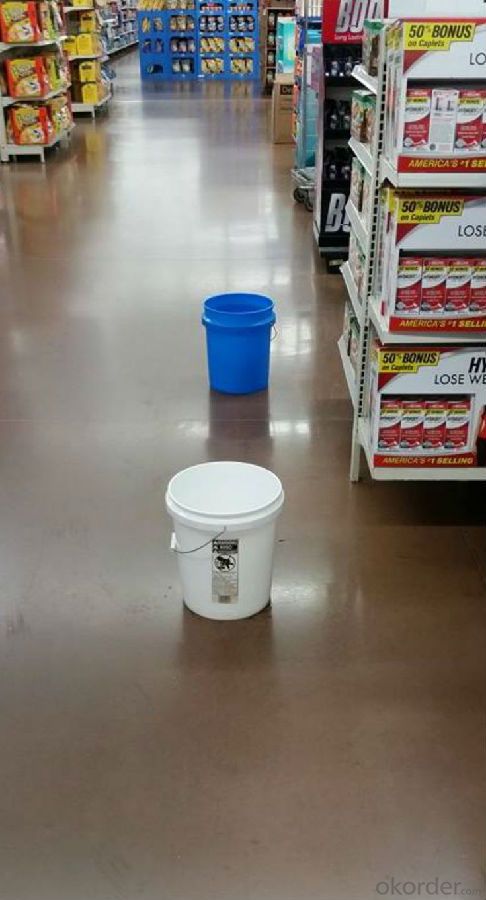
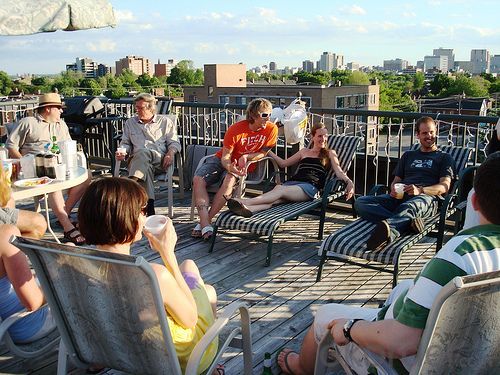
FAQ
Q: What's the delivery time ?
A: 3-5 days for 1-600 rolls, 10-15 days for container.
Q: What's the payment terms ?
A: TT/LC
Q: How do you make replacement with quality problems ?
A: New replacement will be packed into your next order or send to you directly after receive video or photo about quality problems.
- Q:Can a waterproofing membrane be used on PVC roofs?
- PVC roofs, commonly found in commercial and residential buildings, are known for their durability and resistance to weathering. However, like all roofing materials, they can develop leaks and cracks over time. To combat this issue, a waterproofing membrane can be applied to PVC roofs. This membrane, such as EPDM or TPO, is flexible and can easily adhere to the PVC surface, forming a seamless and watertight barrier. It is crucial to ensure that the chosen waterproofing membrane is compatible with PVC roofs and to carefully follow the manufacturer's instructions for proper installation. Additionally, regular maintenance and inspections are highly recommended to promptly detect and address any potential problems before they worsen.
- Q:Can waterproofing membranes be used on concrete dams?
- Yes, waterproofing membranes can be used on concrete dams. In fact, they are commonly used in the construction and maintenance of concrete dams to prevent water leakage and seepage. Waterproofing membranes are designed to create a barrier that is resistant to water penetration, protecting the concrete surface of the dam from damage caused by water. These membranes can be applied to both the interior and exterior surfaces of the dam, providing a reliable and long-lasting solution for waterproofing. Additionally, waterproofing membranes can also help to mitigate the risk of waterborne deterioration, such as freeze-thaw damage and corrosion of reinforcement, thereby extending the lifespan of the concrete dam.
- Q:Why the roof of the waterproof membrane and insulation rock wool board to do between the isolation layer?
- 3, in the insulation layer on whether to protect the isolation layer according to the construction of the insulation layer on the destruction of the role of the waterproof layer. Since the waterproofing membrane has been completed construction, indicating that the flatness has reached a higher demand, and the insulation layer of the grass-roots flatness requirements do not exceed the requirements of the web paving, so waterproof surface without leveling layer, but may need to do protection Isolation layer.
- Q:Can waterproofing membranes be used on concrete surfaces?
- Concrete surfaces can indeed benefit from the use of waterproofing membranes. These membranes are specifically designed to create a barrier against water penetration. They are often employed on concrete surfaces to safeguard them against water damage. Typically, these membranes are composed of rubber, PVC, or bitumen and can be applied to the concrete surface either in a liquid or sheet form. Once applied, the membrane forms a strong and continuous waterproof layer that effectively prevents water from seeping into the concrete. This proves to be particularly advantageous in areas that frequently come into contact with water, such as basements, bathrooms, or outdoor concrete structures. By preventing water-related issues such as cracking, spalling, or mold growth, waterproofing membranes effectively prolong the lifespan of concrete surfaces.
- Q:What are the advantages and disadvantages of waterproofing membrane?
- There are many types of waterproofing membrane, mostly flexible waterproofing membrane. Such as: SBS coil, PVC, EVA, ECB The advantages of the coil is simple operation, do not need any valuable equipment, the basic is the torch, hot melt welding machine, are not expensive, the shortcomings of the base is a higher demand, it is easy to be damaged, resulting in structural leakage.
- Q:Are there any specific safety precautions to consider when installing a waterproofing membrane?
- Yes, there are several safety precautions to consider when installing a waterproofing membrane. Firstly, it is important to ensure that all necessary personal protective equipment (PPE) is used by the installation team. This may include gloves, safety glasses, and appropriate footwear to prevent any injuries or exposure to hazardous materials. Additionally, it is crucial to work in a well-ventilated area to avoid inhalation of fumes or vapors emitted during the installation process. If working in a confined space, proper measures should be taken to ensure adequate ventilation and the use of proper respiratory protection if necessary. Furthermore, it is important to follow the manufacturer's instructions and guidelines for the specific waterproofing membrane being installed. This includes understanding any potential hazards associated with the product, such as flammability or toxicity, and taking necessary precautions to prevent accidents or exposure. Another safety consideration is to ensure that the installation area is properly prepared before beginning the process. This may involve removing any debris, cleaning the surface, and addressing any potential hazards or obstacles that could pose a risk to the installation team. Lastly, it is important to have a designated safety plan in place, including emergency procedures and first aid kits readily available in case of accidents or injuries. Regular safety inspections and monitoring throughout the installation process are also recommended to identify and address any potential safety risks promptly. By following these safety precautions, the installation of a waterproofing membrane can be carried out safely and effectively, minimizing the risk of accidents or injuries.
- Q:Can a waterproofing membrane be used on precast gypsum surfaces?
- Yes, a waterproofing membrane can be used on precast gypsum surfaces. Precast gypsum surfaces are often used in construction for walls, ceilings, and other building components. These surfaces are typically porous and can be susceptible to water damage if not properly protected. A waterproofing membrane is a barrier that is applied to the surface of the precast gypsum to prevent water infiltration. It acts as a protective layer, preventing water from seeping into the gypsum and causing damage such as mold growth or deterioration. There are various types of waterproofing membranes available in the market, including liquid-applied membranes, sheet membranes, and cementitious coatings. These membranes are designed to adhere to different types of surfaces, including precast gypsum. When using a waterproofing membrane on precast gypsum surfaces, it is important to ensure that the surface is clean and free from any contaminants that may interfere with the adhesion of the membrane. The membrane should be applied according to the manufacturer's instructions, taking into consideration factors such as temperature, humidity, and drying time. In conclusion, yes, a waterproofing membrane can be used on precast gypsum surfaces to protect them from water damage. It is essential to choose the right type of membrane and follow proper application techniques to ensure effective protection.
- Q:Can a waterproofing membrane be used on terraces or patios?
- Yes, a waterproofing membrane can be used on terraces or patios. In fact, it is highly recommended to use a waterproofing membrane in these areas to prevent water damage and leakage. Terraces and patios are exposed to various weather conditions, including rain and snow, which can lead to moisture seeping into the underlying structure. A waterproofing membrane acts as a barrier, preventing water from penetrating the surface and protecting the integrity of the terrace or patio. It helps to extend the lifespan of the structure and prevents costly repairs in the long run. Additionally, using a waterproofing membrane also helps to create a more comfortable and usable space, as it eliminates the risk of water accumulation and potential slip hazards. Overall, investing in a high-quality waterproofing membrane is a wise decision for anyone looking to protect their terrace or patio from water damage.
- Q:Can waterproofing membranes be used on concrete manholes?
- Yes, waterproofing membranes can be used on concrete manholes. Waterproofing membranes are commonly used to protect structures from water infiltration and can be applied to various surfaces, including concrete. Concrete manholes are prone to water ingress, which can lead to deterioration and structural issues over time. By applying a waterproofing membrane to the concrete surface of the manhole, it creates a barrier that prevents water from penetrating the structure. This helps to extend the lifespan of the manhole and ensures its integrity over time. Additionally, waterproofing membranes can also provide protection against chemical attacks and other environmental factors, further enhancing the durability of concrete manholes.
- Q:Can waterproofing membranes be installed on uneven surfaces?
- Yes, waterproofing membranes can be installed on uneven surfaces. In fact, one of the advantages of waterproofing membranes is their ability to conform to various irregularities and unevenness in the surface. These membranes are typically flexible and can be easily molded and adjusted to fit the contours of the substrate. Additionally, some waterproofing membranes have self-adhesive properties or can be applied with adhesives, allowing them to adhere to both smooth and uneven surfaces effectively. However, it is important to note that proper surface preparation is crucial for a successful installation. The surface should be clean, dry, and free from any loose materials or debris to ensure optimum adhesion and performance of the waterproofing membrane.
1. Manufacturer Overview |
|
|---|---|
| Location | |
| Year Established | |
| Annual Output Value | |
| Main Markets | |
| Company Certifications | |
2. Manufacturer Certificates |
|
|---|---|
| a) Certification Name | |
| Range | |
| Reference | |
| Validity Period | |
3. Manufacturer Capability |
|
|---|---|
| a)Trade Capacity | |
| Nearest Port | |
| Export Percentage | |
| No.of Employees in Trade Department | |
| Language Spoken: | |
| b)Factory Information | |
| Factory Size: | |
| No. of Production Lines | |
| Contract Manufacturing | |
| Product Price Range | |
Send your message to us
SBS/APP Modified Bitumen Waterproof Membrane- Hot Sell In South East Asia
- Loading Port:
- Shanghai
- Payment Terms:
- TT OR LC
- Min Order Qty:
- 44 roll
- Supply Capability:
- 100000 roll/month
OKorder Service Pledge
OKorder Financial Service
Similar products
New products
Hot products
Related keywords
